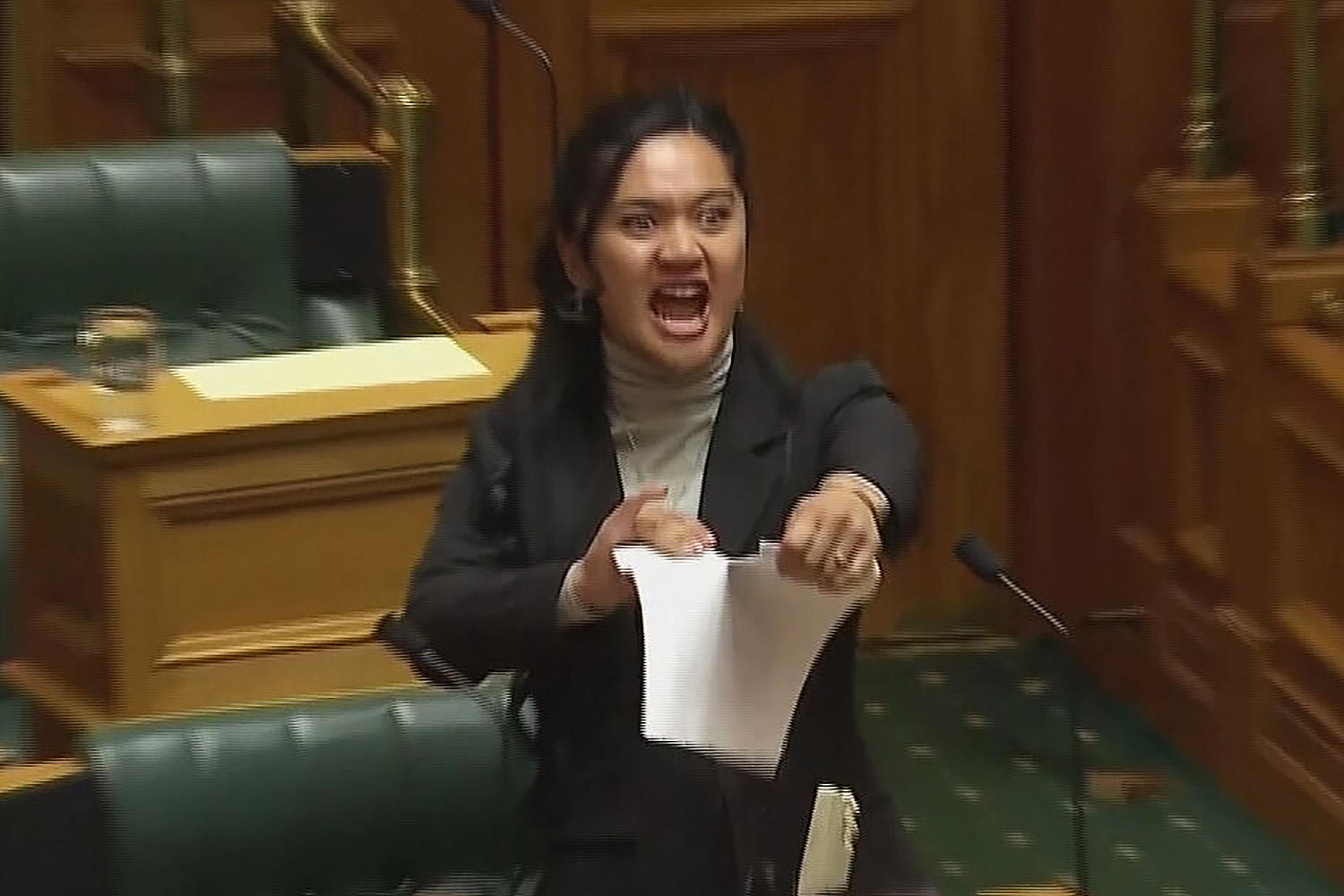Share this @internewscast.com

Three Māori politicians in New Zealand have been handed unprecedented suspensions lasting up to three weeks following their protest haka in Parliament last year against a controversial bill.
This demonstration, which took place in November, captured global attention. The lawmakers performed the haka, a traditional dance symbolizing defiance, which holds significant cultural value in New Zealand. Their protest was aimed at opposing a piece of legislation that sought to reinterpret the nation’s founding document, a treaty established 184 years ago between British colonizers and the Indigenous Māori.
A parliamentary committee last month found these politicians in contempt of parliament. They advised the suspensions, which could last up to three weeks, citing their actions as potentially intimidating to other House members.
Debbie Ngarewa-Packer and Rawiri Waititi, co-leaders of Te Pāti Māori, the Māori party, which holds six of Parliament’s 123 seats, were suspended for three weeks each.
Hana-Rawhiti Maipi-Clarke, who at 22 is New Zealand’s youngest legislator, was suspended for one week on the recommendation of the committee, which said in its report that she had demonstrated “some level of contrition” in her written statement.
The vote was 68-55 against Maipi-Clarke, 68-54 against Ngarewa-Packer and 68-53 against Waititi, all of whom were suspended effective immediately.
It is rare for New Zealand lawmakers to receive such suspensions, which are unpaid, and the longest anyone had previously been suspended was three days.
The opposition Labour Party as well as the Green Party criticized the suspensions as disproportionate, with the Labour Party proposing censure instead.
The three lawmakers performed the protest haka in November during the reading of a bill that would have redefined the Treaty of Waitangi. Signed in 1840 between the British Crown and Māori chiefs, the treaty established British governance and structures to protect Māori rights and continues to influence policy today.
The legislation was brought by the small libertarian party ACT New Zealand, which said the treaty had been misinterpreted to give Māori people special treatment.
Critics of the bill, which was defeated in April, said it would undo decades of progress for Māori, who make up about 20% of New Zealand’s 5 million people and fare worse than the rest of the population in health, education and the criminal justice system.
One of the Māori lawmakers, Maipi-Clarke, led the haka by tearing up a copy of the bill, joined by other Māori members and some visitors in the public gallery. Video of the protest went viral and gathered hundreds of millions of views across social media.
Some lawmakers objected to the way their Māori colleagues advanced toward them across the floor.
“This was a very serious incident, the likes of which I have never seen before in my 23 years in the debating chamber,” said Judith Collins of the center-right National Party, chair of the parliamentary committee that issued the report.
She added that the lawmakers had performed the haka without permission and that the disruption had suspended legislative proceedings for 30 minutes.
The three Māori lawmakers declined to appear before the committee during its investigation, citing disrespect for their cultural traditions. Their party said the way it was being conducted was “grossly unjust” and that “this was not about process, this became personal.”
The committee said the lawmakers were being sanctioned not for performing the haka, but for “the time at and manner in which it was performed.” It said the severity of the sanctions was intended to “leave members in no doubt that the behavior discussed is not acceptable.”
The vote had originally been scheduled for last month but was postponed so that the three Māori lawmakers could participate in debate over the federal budget.
Performing haka in Parliament is not uncommon, and is typically seen when Māori members celebrate the passage of a particular bill. The dance is known abroad for being performed at matches by New Zealand’s rugby teams, and variations of it are also performed at funerals and formal welcomes.
“It would have been clearly understood by everyone in the parliament that this was a peaceful act of protest done in a way that aligns with Māori tradition,” said Julian Rawiri Kusabs, a Māori historian and researcher at the University of Melbourne in Australia.
Kusabs said the suspension was a setback in decades of reconciliation efforts between the New Zealand government and Māori communities, whose members have had to navigate “a highly complex and frequently painful relationship” even to achieve representation in Parliament.
The suspension, he said, reinforces the longstanding perception that “Māori culture is not equally respected within New Zealand’s formal institutions of governance.”










